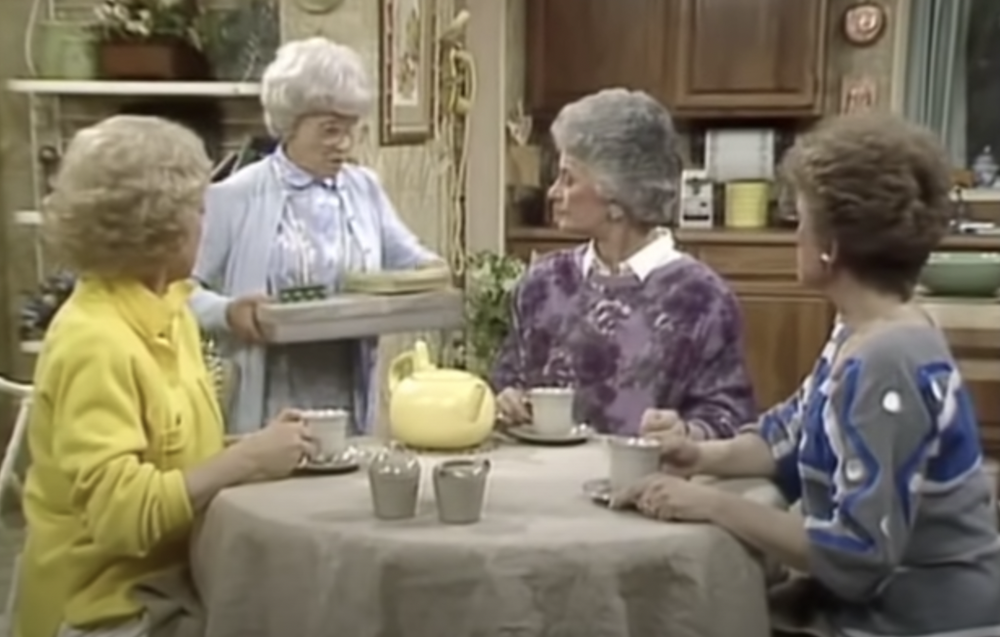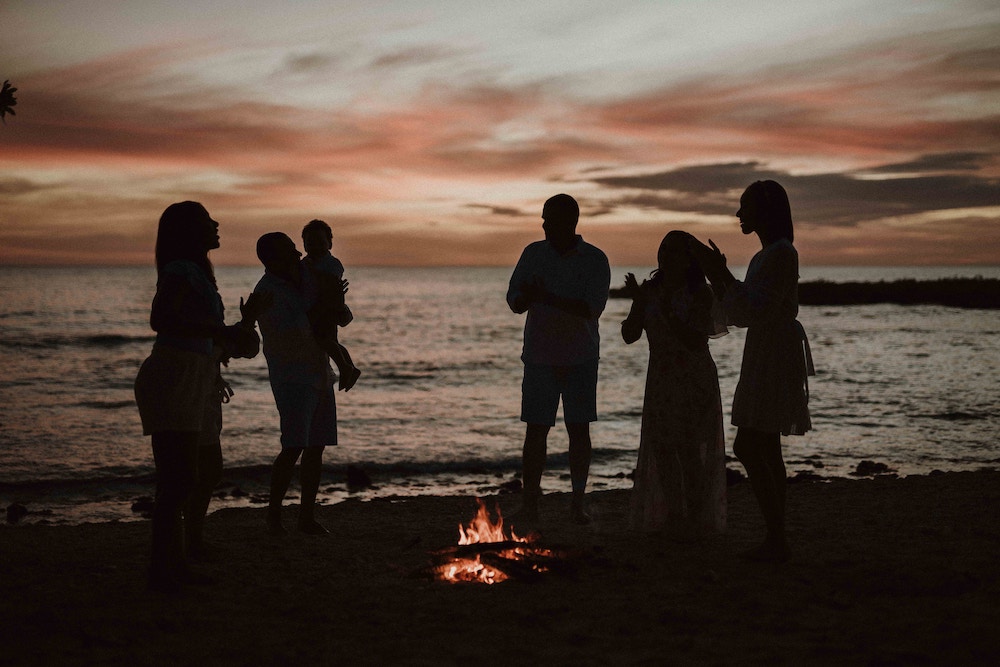Books & Culture
We All Want to Live in the Golden Girls House—Don’t We?
A house filled with one’s closest friends living together and caring for each other as senior citizens is deeply comforting

After my father died, my older sister and I stayed with my mother for a while. I couldn’t stop thinking of Grey Gardens, minus the fabulous headscarves; Big and Little Edie Beale kept winding their way through my head. It was a cruel comparison—as a trio of single women, I could have easily renamed us the House of Strong Minded, Powerful Women, as that is what we have always been, with or without my father. Unfortunately, it was too easy to think of all the negative images of women aging alone first: the jilted Miss Havisham in Great Expectations, exacting revenge on men through her adopted daughter; Sunset Boulevard’s demented Norma Desmond, waiting for her closeup with movie directors who’d long forgotten her; Marge Simpson’s vengeful, chain-smoking older twin sisters. Without the presence of a man, an aging woman grows irrelevant, absurd, batty. Our culture allows for few other narratives.
In trying to think of more positive portrayals, only one immediately comes to mind for me: the 80s sitcom The Golden Girls, about four older single women—Blanche, Rose, Dorothy and her mother Sophia—who live together in Miami following their husbands’ deaths, or, in Dorothy’s case, after her divorce. Ever since it first aired in 1985, The Golden Girls has been telling aging single women what the rest of the world never has: that our lives are just as interesting and worthwhile without a man in the picture, that as women we’re capable of providing as much if not more comfort and assistance to each other in our golden years than a partner ever could. When the first episode aired, Estelle Getty, who played Sophia, told the New York Times she hoped the show would kill “the notion [that] the world is Noah’s Ark and no woman is worth the powder to blow her to hell with unless she’s attached to a man.”
My friend Janis would allay her fears of being alone with the argument that it would all be fine because she and another good friend of hers would “just live in The Golden Girls house together.” The concept of a house filled with one’s closest friends who live together and take care of each other in their senior years is an enduring source of comfort for her—as it has been for many women who worry they will end up spending this time in solitude. There is something inherently soothing about the show, particularly when confronted with a stressful, uncertain future; a friend recently told of The Onion’s famous front page after 9-11, showing a TV schedule with The Golden Girls on endless loop.
In a Huffington Post article last year entitled “My Friends And I Are Going To Live In A ‘Golden Girls’-Style Situation After We Retire,” the millennial writer Ashley Brooks talked of setting out initial plans for a Golden Girls-style house with her female friends later in life. “Why couldn’t we use Blanche, Rose, Dorothy and Sophia as a model to plot our own post-midlife sorority setup?,” the author asked. Among her friends, she had already picked out who would be the Blanche and who would be the Dorothy.
The idea of a Golden Girls house is not just appealing to longtime single women or divorcés, but anybody who fears not being able to meet this unrealistic expectation of lifetime partnership or afford living on their own in their last years. Given the average life expectancy today and the rising cost of nursing homes and long-term healthcare, living alone in our last years is a luxury few of us will be able to afford; financial magazines from Forbes to Kiplinger’s have billed Golden Girls-style houses as a more affordable, less lonely option into retirement.
There is something inherently soothing about the show, particularly when confronted with a stressful, uncertain future.
While I do have several issues with the show itself—namely its reliance on racist, sexist, homophobic and transphobic humor that cannot be dismissed with the old “it’s a product of its times” excuse—I admit that as a single and childless woman in my mid 40’s, I have considered a Golden Girls house as a viable solution to my own questions about who will care for me and keep me company in my final years, in the absence of a child or partner.
I discussed the concept of a Golden Girls house the other day with an older friend of mine. “I mean, it sounds like a dream, doesn’t it? Who doesn’t want to hang out with their friends and eat cheesecake for the rest of their lives?”
“You know,” she said, “the only thing about The Golden Girls…”
“—is that they were all white wealthy women?” I finished.
“… is that they were all healthy.”
In the last months of my father’s life, my mother converted the basement floor of our house into a mini hospice, hiring round the clock, in-home care to assist her and ensure there would always be someone by his side at all times. The one who stayed with us up until the end was a no-nonsense older nurse who interfered with our lives upstairs as little as possible, took direction without complaint, and worked tirelessly. At the time she was taking care of my father I would have offered her anything, and now I’m ashamed to say I don’t remember what country she was from or what her name was—I had to ask my mother later. Agnes watched over my father night and day, changing his diapers and feeding him until he drew his last breath. I was in the living room when she ordered me downstairs that day, the one and only time she ever raised her voice.
“What? What is it?” I asked.
“Just go down,” she commanded.
On the basement floor where we had set my father’s bed up, my mother was already there, with her arms around my father. He had died just moments before. I began screaming as I clutched at my mother. My knees collapsed a little. My mother’s arms left my father’s body to wrap themselves around me.
Agnes watched over my father night and day, changing his diapers and feeding him until he drew his last breath.
“What is this? What is this?” the nurse asked. I sensed that she wanted me to be stronger for my mother, pull it together—after all, she was the one who cared for him day in and day out, who had fed him for weeks on end. She was the one who watched him take his last breath while I was upstairs. All I had to do was drop by once a day to visit with him for an hour or so before escaping upstairs to watch TV.
We had to dress and change my father before he could be picked up by the funeral parlor, and as the nurse heaved my father’s body to the right and the left, rubbing him down with a warm, damp cloth, I tried to assist as much as I could. Mostly I just stood there, afraid to touch my father’s body, to know what it was like now. I had attended funerals before, but never experienced the death of someone so close to me. Onscreen, people just trickle out of hospital rooms after their loved one passes, and it’s assumed some faceless hospital staff or hospice care worker takes care of the rest, whatever “the rest” entails. Agnes set about it as if she had done it a million times before, lifting up my father’s legs gently but firmly to wash him, removing his shorts and putting on new ones. I am no longer convinced there is any dignity in death; the horror lies in the witnessing of this loss. And yet, Agnes had enough dignity to make up for what I lacked, and for what my father’s death had erased.
As I lifted my father’s arm to help Agnes dress my father, I couldn’t believe that it was his anymore; it was flesh hanging off bones, light as a bird’s wing. Were these the arms that once held me back from running into the street? I was surprised by how strong he was back then, wrapping his arms around me, a vise from which I couldn’t escape. I put on his socks now, lifting each cold foot to stretch fresh cotton knit over his heels.
The story of The Golden Girls, to paraphrase Joan Didion, is a story I tell myself in order to live. It works until I think of my father’s last days, the anguish of his death and the days that led up to his passing.
There was a reason the Girls were all relatively healthy until the last season when Rose goes into cardiac arrest: They weren’t that old. I always assumed that they were in their 60s, except for Sophia, who I pegged for early 80s, but when the show began, Blanche, Dorothy and Rose were only in their 50s, tiptoeing toward but not quite having reached their golden years. In Season 2, Episode 8, “The End of the Curse,” Blanche experiences menopause for the first time.
What is never shown and only hinted at in The Golden Girls are the later years, when the women become fully bed-ridden and incapacitated, when they can’t feed or bathe themselves or go to the bathroom without assistance. Rose goes into cardiac arrest near the end of the last season and undergoes triple bypass, but she makes a lightning fast recovery in time for Dorothy’s wedding. It wouldn’t make for much of a sitcom if the characters were gravely ill—although death is still present enough, roaming their lanai like the unnamed fifth roommate. The Girls discuss their fear of death and aging, donate kidneys to siblings, mourn ex-husbands and friends who passed, and encounter terminally-ill friends who wish to end their lives early.
It works until I think of my father’s last days, the anguish of his death and the days that led up to his passing.
It’s interesting that in all the articles I have read pushing Golden Girls retirement homes, no one ever talks about the “Sophia’s Choice” episode from Season 4. I had forgotten about it, until a recent rewatching. After Sophia rescues her friend Lillian, who suffers from dementia, from a poorly equipped nursing home, she takes her back to the house to live with her and Blanche, Rose and Dorothy. The Girls don’t make it two days with Lillian.
“I just cannot believe Lillian has only been here for 24 hours,” says an exhausted Rose, as they all slump over the kitchen table.
“I cannot believe Mom thought she could handle her alone,” adds Dorothy. “I mean, it’s almost too much for the four of us.”
Agreeing that they can no longer take care of Lillian, Rose finds Lillian a nicer nursing home and Blanche pays for the next few years of Lillian’s bills with a bonus check from work that she had set aside for a breast enhancement. Prompted by the experience with Lillian and fears of their own experiences to come, they decide to make a pact to “always take care of each other, no matter what.”
If you could fast-forward to the next decade or two of The Golden Girls, I wonder if it would show these women diligently taking care of each other in their incontinent years, when some of them may as well need 24-hour care like Lillian—or if it would show the at-home nurse in the corner, wiping cheesecake crumbs off their faces or on hands and knees, cleaning the toilet? Imagine the curtain pulling back to reveal the immigrant caregiver at the nursing home, doing what some of us can’t or don’t want to do round-the-clock, lest it disrupt the responsibilities and lives we already have.
Imagine the curtain pulling back to reveal the immigrant caregiver at the nursing home.
Which brings us to another aspect of the show: I am far from the first person to watch The Golden Girls and wonder where all the brown people evaporated to, considering this show is supposed to take place in Miami, a city that even back in 1980 boasted well over twice as many Hispanic people as white folk. What are the implications when we write the immigrant worker out of the storyline, both on screen and in our own lives? I loved the 2022 movie Triangle of Sadness not just for the easy schadenfreude of watching spoiled rich people come undone, but for that shot of the hull of the cruise ship, where they housed the Filipino cruise workers in a modern-day version of Downtown Abbey. As a Filipino-American, I always thought I was more sensitive to the unseen immigrant labor from poorer countries like the Philippines that keeps Western countries afloat. However, in my own life, I had failed with Agnes.
In the end, it was really she and my mother who did most of the caring; we were fortunate enough to be able to afford long-term health care insurance for my father, so my mother could get someone in to help. Otherwise, I would have needed to step in far more than I did. Would I be able to care for good friends better than I had my own father? And is this something that one gets better at with age and more death?
I want to believe that my girlfriends and I would take care of each other until we died, but I have also seen the distancing of friends when they have partners and children—this is their new unit, their main focus, and time with friends must be fit in between their child and household duties. I have seen it in myself when I get a boyfriend and see my friends less than I did before, clearing the weekend for days with my new love, prioritizing my time with him. I have started to question if a Golden Girls house is the ultimate goal or just a backup plan for when our partners fall short or die off first—and if it’s the latter, how strong this ideal is when so many of us have spent the bulk of our lives prioritizing traditional family units or “significant others” above all else.
Over twenty years ago, I suffered from a severe depression that rendered me unable to care for or watch over myself. My father didn’t drag me home, where he knew I feared I would backtrack. Instead, he closed up his practice and flew to New York, where I was living, to care for me. My greatest shame is that I do not think I did a tenth as much for him when he was diagnosed with Alzheimer’s seven years later, or in the ten years of suffering he would endure following this diagnosis, as his mind and body slowly shut down from dementia and then cancer. I think about this now when I call my mother from London, where I currently live, and she asks me how long I plan on staying there and when am I coming home, and I tell her that this is where I live now, this is my home. I have wanted to live abroad since I was a kid and have spent the last thirteen years taking on a variety of jobs that would lead to a long-term visa, and yet when I say to my mother “London is my home now”, it sounds trivial and silly, like I’m an 18-year-old college kid extending their study abroad too long instead of a 47-year-old woman who has been planning this for over a decade.
I wonder if it would sound more acceptable if I had a husband with a job and children who were in school here.
I wonder if it would sound more acceptable if I had a husband with a job and children who were in school here, all of whom could never possibly be as easily uprooted as a single, childless middle-aged woman. To my mother, it probably wouldn’t; she would then just wonder why her grandchildren had to live all the way in London instead of closer to her. And yet sometimes I can’t help but think that it does—if not to her, then to others, to society, to me, even. I think of my trips to the Philippines, a country which is still very much a collectivist vs individualist society, and where cousins of mine grew up in multi-generational family compounds in Quezon City with kids, grandparents and parents looking in on each other every day. I think of all the nuclear-family Filipino homes I’ve been to in America, with room for Mom, Dad, a few kids, and always an extra room for Lola. I think of all this as my mom and I talk to each other on our iPhones from our single-occupancy homes, over 4,000 miles and an ocean apart.
How much of our lives and our independence are we willing to sacrifice to care and comfort those closest to us? Where do we draw the line, and what does that say about us?
If I needed to fly back and give immediate care to my mother or sisters I would, and yet how quickly, sometimes without realizing it at first, one can slide into thinking of oneself in the role assigned: the selfish single woman who chose not to have children and who clearly hasn’t put anyone but herself first, versus a selfless mother who already has shown how giving she is with her children and just needs to extend this innate generosity to others in the family. (This scenario is also untrue: statistically, unmarried adults are more likely than married to provide most of the care to a parent.)
For most of us, it will not be merely a question of how selfless we are but how much money we make and how much care we can afford. Our country may be one of the richest in the world, but we have not set ourselves up to provide nearly enough public funds to help care for the number of aging baby boomers that will require nursing or in-home care—a 75% increase from previous generations.
There is no talk of what to do when the Golden Girls can no longer fund Lillian’s nursing home, but you can squeeze the entire long-term care crisis into that gap. The beauty of a 30-minute sitcom like The Golden Girls is that topics like these can be touched upon and eased with humor, just in time for commercials. We are not given such reprieve in real life. The show did its strongest work not in proffering the concept of a Golden Girls house but in providing a brief window into questions about the human limitations that we cannot always answer but must ask ourselves anyway. It was far from a perfect show, but in some of its grossest omissions is where some of the most important questions lie.
At the end of the Sophia’s Choice episode, the Girls decide to assuage their fears that they’ll end up like Lillian, with nobody they can rely on to take care of them or keep them company in their final years. They decide they will all go together to the nursing home if they have to. It’s a reassuring thought—until Rose asks, “But what happens when only one of us is left?”
There is no talk of what to do when the Golden Girls can no longer fund Lillian’s nursing home.
For a few seconds, there is nothing but silence. The silence will eventually be disrupted by a snappy one liner from Sophia, but for just a brief moment, the human fear of death and dying is allowed to assume the frame. It crowds out the set’s pastel couches and wigs, extinguishes the comebacks about menopause and ensuing laugh tracks. There is no cut to commercial.
I am back in my parent’s house, walking downstairs to see my father one last time. The house is still. Light filters up from the room below, guiding my way down.
I do not feel comforted. I am not supposed to be.








